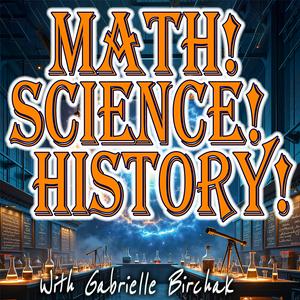FLASHCARDS! Google Maps, Waze, and the Science of Map Distortion
We use maps all day, including Google Maps, Waze, Apple Maps. We use them without even noticing that every one of them distorts reality. In this episode, Gabrielle explains why flattening a round Earth always bends the truth, how classic projections (like Mercator) live inside today’s apps, and why those distortions shape our mental picture of the world. Practical, visual, and myth-busting, this is cartography you can feel on your daily commute. To hear the podcast on Marie Tharp, visit: Math Science History with Gabrielle Birchak Three Coordinates to Remember Why distortion is unavoidable when projecting a 3D globe onto a flat screen (thanks, Gauss). How Web Mercator powers Google Maps/Waze, great for street-level navigation, misleading at global scales. How projection choices shape perception, from Greenland vs. Africa to who appears “big” or “central” on a map. Resources & Visuals Gall–Peters (equal-area) projection: Peters Projection Map: Everything Your Ever Wanted To Know Compare Map Projections: https://map-projections.net/compare.php Buckminster Fuller’s Dymaxion map (unfolded globe): https://www.bfi.org/about-fuller/dymaxion-map “The True Size Of…” (drag countries to compare real sizes): https://thetruesize.com 🔗 Explore more on our website: mathsciencehistory.com 📚 To buy my book Hypatia: The Sum of Her Life on Amazon, visit https://a.co/d/g3OuP9h 🌍 Let’s Connect! Bluesky: https://bsky.app/profile/mathsciencehistory.bsky.social Instagram: https://www.instagram.com/math.science.history Facebook: https://www.facebook.com/mathsciencehistory LinkedIn: https://www.linkedin.com/company/math-science-history/ Threads: https://www.threads.com/@math.science.history YouTube: Math! Science! History! - YouTube Pinterest: https://www.pinterest.com/mathsciencehistory 🎧 Enjoying the Podcast? If you love Math, Science, History, here’s how you can help:🌟 Leave a review! It helps more people discover the show!📢 Share this episode with friends & fellow history buffs!🔔 Subscribe on your favorite podcast platform ☕ Support the Show: Coffee!! PayPal 🛍 Check out our merch: https://www.mathsciencehistory.com/the-store 🎵 Music: All music is public domain and has no Copyright and no rights reserved. Selections from The Little Prince by Lloyd Rodgers Until next time, carpe diem!


